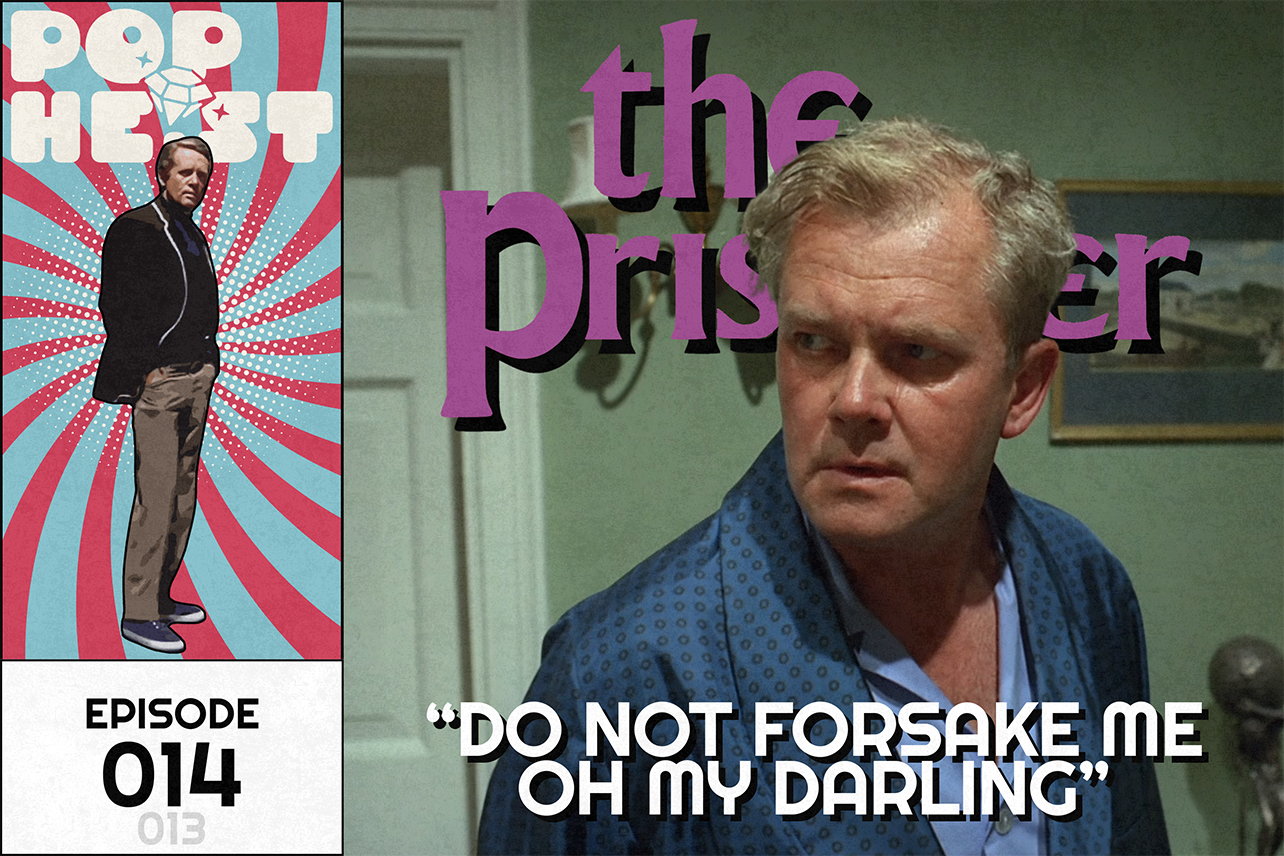In PRESTIGE PREHISTORY, Pop Heist critic Sean T. Collins takes a look at classic TV shows that paved the way for the New Golden Age of Television — challenging, self-contained series from writers and filmmakers determined to push the medium forward by telling stories their own way.
The Prisoner Episode 13 (airdate order) / Episode 14 (AVC order)*
"Do Not Forsake Me Oh My Darling"
Original Airdate: Dec. 22, 1967
Writer: Vincent Tilsley
Director: Pat Jackson
Cast: Patrick McGoohan, Nigel Stock, Clifford Evans, Zena Walker, John Wentworth, Hugo Schuster
*NOTE: The Prisoner's proper running order is a matter of dispute; Pop Heist is using the AV Club order for the show
The first thing anyone does is search for clues. Keep that in mind.
And I do mean the first thing, before even the thunderclap that kicks off the opening credits. While this episode does restore the first half of its familiar title sequence after "Living in Harmony" abandoned it for the Wild West, a cold open kicks things off, for the first time in series history. Not a mold left unbroken on this show.
In that cold open, a group of men working for an unnamed intelligence agency examine a series of what look like vacation slides, in hopes of locating a high-value scientist pictured in one of them, Professor Jacob Seltzman (Hugo Schuster). Yet for all their examination and analysis, they can't come up with a single clue as to the man's whereabouts from them. They must have that professor!
After this we get the familiar Lotus-driving, desk-pounding, gas-inhaling business of the usual opening sequence, but only up to a point. The music accompanying the wake up, look out the window, and see the name of the episode I'm now in part of Six's arrival in the Village is different, and the entire back-and-forth between Number Six and Number Two that ends with "I am not a number, I am a free man!" is excised entirely.
The name of the episode Six is in this time is "Do Not Forsake Me Oh My Darling." That, fellow citizens, is the clue to why this episode exists.
So. Instead of Six running from Rover and swinging at the sky while Two cackles derisively, we watch as a visitor arrives in the Village via helicopter. Referred to near the end of the episode as "Colonel" (Nigel Stock), he's some kind of intelligence operative. While he's been trusted by the Village's authorities to visit the place on a secret mission, it appears as if he has little to no prior knowledge of the place or its purpose, let alone his own in being sent there to begin with.
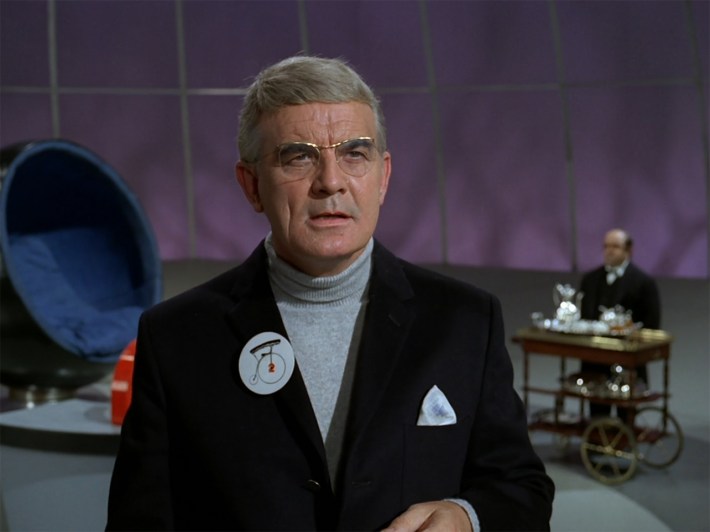
Number Two (Clifford Evans), whose absolutely awful toupee I'm not sure if we're supposed to notice and consider an aspect of his character or not, fills the frustrated operative in: Unsurprisingly, his mission is centered on Number Six. Two shows the Colonel surveillance footage of their restless prize prisoner, whom the newcomer immediately and incorrectly dismisses as an idiot for spending his time pacing back and forth. (Don't go feeling too sympathetic towards the Colonel, in other words.)
Two explains that Six was the last man to see Seltzman, who'd perfected a procedure for transferring one man's mind into another man's body before disappearing. We're helpfully told it's essentially a high-tech, more intense version of the "thought transferrence" that highly disciplined "yogis," pronounced "Yo, Guys" by Number Two, have proven capable of already. ("I've seen it done in India," says the Colonel.)
To the skeptical Colonel's amazement, Two reveals that the Village has its own version of the Seltzman machine. There's some sci-fi jargon to explain how it works, but it's the visual that has an impact here. The machine's energy fields are depicted as dazzling displays of red and blue light you need Atomic Age goggles to observe.
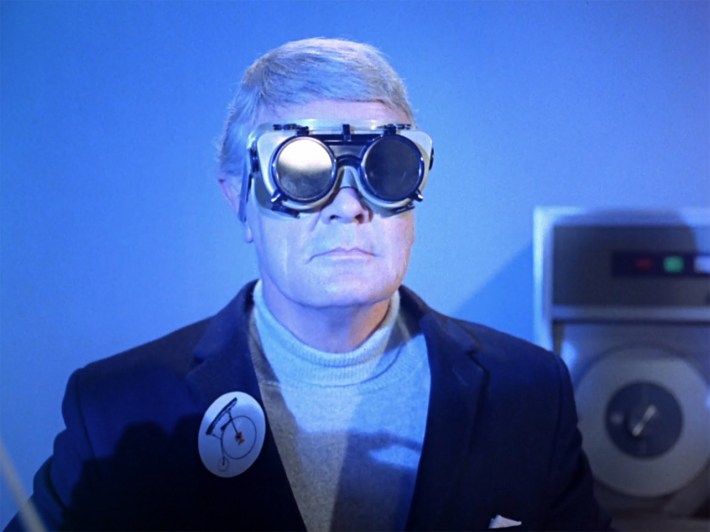
The Village's scientists have already perfected the art of wiping out memories in their "Amnesia Room," but with Seltzman's procedure, they can implant one of their own operatives' minds into an enemy during a spy swap, turning him into a mole deep within the other side. There's just one problem, though we don't learn it for quite some time: They don't yet know how to put their men back in their own bodies when the mission is completed.
Six is abducted by the Village's helmeted goon squad and dragged off to undergo the procedure, while Two tells the Colonel "Tomorrow you'll wake up a new man." The next morning, first-person POV shots guide us around Six's apartment, while his inner monologue (another first for the series) narrates the action.
But it's not just the segment of his flat that they reproduced in the Village — it's the real thing, right there in Swinging London. When he looks at his calendar, he has a date with a woman named Janet coming up that he can't miss. And when he looks in the mirror, he's not Number Six at all. He's Six's mind inside the Colonel's body. He's home free, but he's still a prisoner.
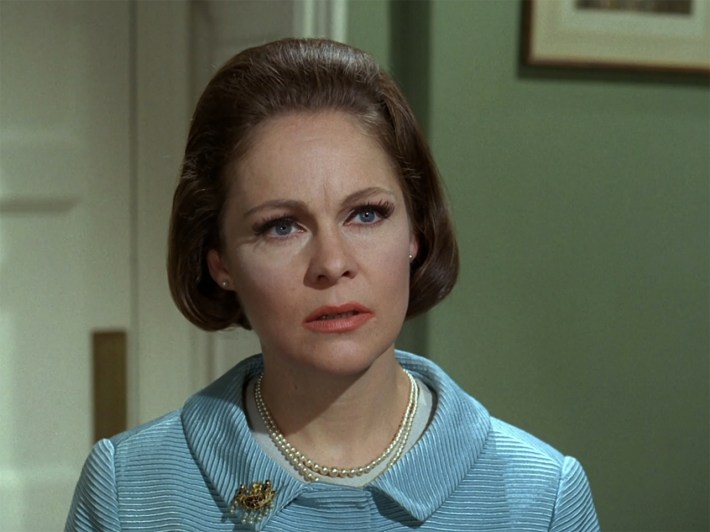
Now that right there is worth thinking about for a moment. You would think that if the Village wanted to learn more about Six's contacts and conduct prior to his resignation, they'd send the Colonel in Six's body, not the other way around. I believe the idea is that they've exhausted their examination of the missing Six's belongings and don't believe sending an undercover agent would help, not even an agent going undercover as Six himself. They need the real guy, or at least his mind, to find his own clues, crack his own codes, and find his own missing professor friend.
It's a pretty big leap of faith, but fortunately, since otherwise we'd have no show, Colonel Six does exactly that. Overlaying the slides that stumped his old superiors using a simple alphanumerical cipher derived from every other letter in Seltzman's name, he reveals that the professor is hiding out in Austria. He drives all the way there in his little Lotus-7 in hopes that his old friend is capable of reversing the procedure, which he disavowed and discontinued developing for justified fear of its potential weaponization.
He's not alone. All throughout the episode he's been tailed by goons working for both his old superiors and the Village — in this case, for once, they're not one and the same. When the regular spy attacks him in an attempt to get to Seltzman, the Village's spy gasses the place, and Colonel Six and Professor Seltzman are brought back to the open-air prison.
Once there, Two and Seltzman strike a bargain to get the professor to attempt a reversal of the mind-swap project, putting both men back in their own bodies. Seltzman agrees to do it if he's allowed to work alone, and though he uses himself as some kind of mental conduit in the painful-looking science-fictional procedure, it seems to go off with out a hitch.
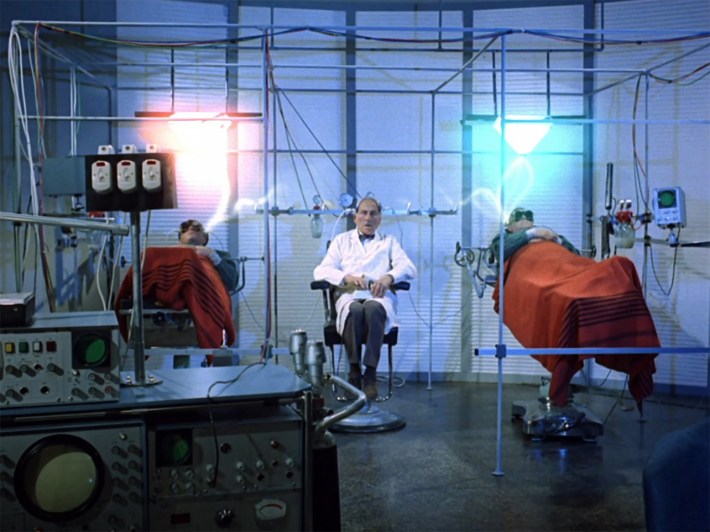
As Six awakes from his drug-induced slumber, the Colonel says "I trust I've been of service" and heads off for his helicopter home.
There's a reason Seltzman wanted to work alone, though: He had a different plan in mind. When the old man wakes up, his words reveal him to be none other than the Colonel, trapped in the body of the now-dying scientist. Seltzman himself is inside the Colonel's body, hijacking it to make his escape. Now, says a triumphant Six, he's "free to continue his experiments in peace." The end.
But we've skipped over the important thing: the episode's title. "Do Not Forsake Me Oh My Darling" does not refer to Six's relationship with Seltzman, or with his boss, Sir Charles Portland (John Wentworth), who while not involved with the Village is in no mood to help this apparent stranger who claims to be … his son-in-law-to-be?
It turns out that before he was disappeared by the Village's undertakers, Number Six was in love.
The woman he loves is Janet (Zena Waker), Sir Charles's daughter. The man's shocked reaction to Six asking for his blessing prior to his proposal is one of the personal details Colonel Six drops in hopes of convincing people he's who he says he is. But other than information he could conceivably have extracted from the "real" Six or identical handwriting that only serves as proof if someone happens to have an old letter or something to cross-reference it with, he can't convince anyone. This includes Sir Charles, whom he visits after first recreating the opening sequence shot for shot, then a cramped and lengthy elevator ride with another colleague that's somehow one of the most visually striking things the show has done.
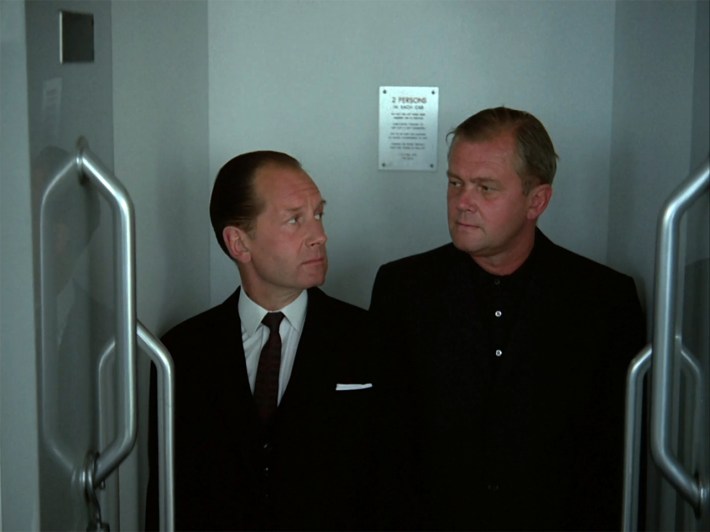
Fortunately, Setlzman does have such a letter, which he kept despite knowing that doing so was stupid from an opsec perspective because of his sentimental attachment to Six. But Janet is different. That's the woman he loves. When she shows up and finds this strange man in her fiancée's apartment, he learns from her that he's been gone for a full year by now. A full year of his life with this woman, gone, stolen by the Village. The misery of being able to see and talk to her again but still unable to reveal himself to her fills him with so much rage he smashes his mirror.
Even though he's doomed to be in the wrong body, even though he's doomed to inevitably return to the Village to complete the procedure, even though he initially demurs rather than scare her away with the crazy-sounding truth, he has to convince her he's the man she loves, and not through anything as dry as handwriting analysis. So after tracking her down at a party, he tells her to grab the receipt he needs to pick up the slides and meet him outside, where he'll deliver a message from "Number Six".
The message is a kiss. Boy, is it ever. In a long take, over electric guitar music that is almost ambient in its plaintiveness, he shows her who he is. "Who else could have given you that message?" he says afterwards. Oooh-whee, that is romance.
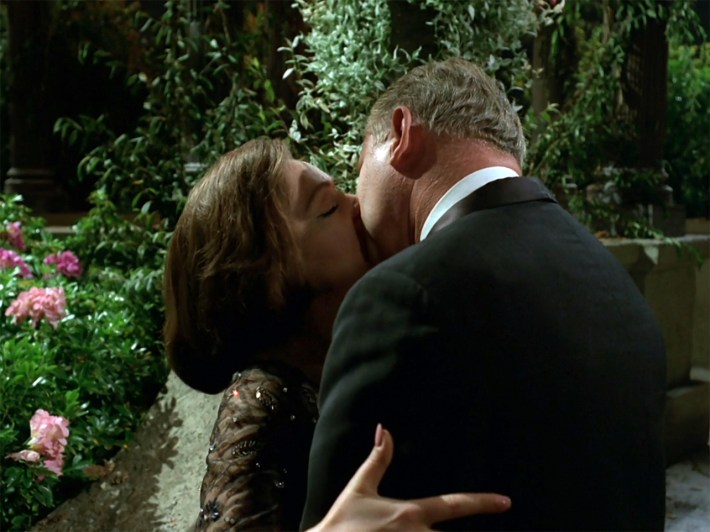
It's also not Patrick McGoohan. Six finally scores (sex afterwards is faintly but legibly implied), including a big on-screen kiss, but he's not Six as we know him. Remember, the devoutly Catholic star of this secret-agent show had a no-kissing clause.
Still, we needed this, I think he realized. We needed to know that there was more to Number Six's life before the Village than a stint on Her Majesty's Secret Service, a stormy resignation, and a stubborn refusal to explain why. We needed to know that he cared about someone other than himself, had other ideals beyond independence and personal liberty. Personally I think it's safe to assume he does, that he soured on the work he was doing in some way. We know from "A. B. and C." that he didn't resign to sell out or switch sides. In "The Chimes of Big Ben" he began to explain his resignation by saying "I resigned because for a very long time, I—" before the eponymous bells toll. Some kind of moral reason is implicit.
But love? Love indicates he's more than a man of principle. He's a man. There's a woman he loves waiting for him back home. There's a life that's been taken from him. If he can have that life back however briefly, in however strange a way, he'll take it. If he can pay back the people who cruelly taunted him with it only to yank it away by helping Seltzman escape and trapping his enemy in the wrong body, he'll do that too.
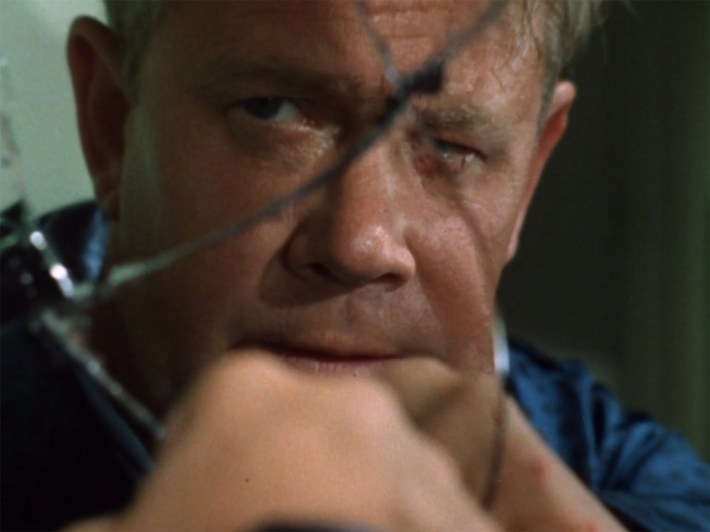
That bittersweet meeting in the arbor makes putting up with this episode's logical inconsistencies worth it. So do music director Albert Elms's superb, minimal rearrangements of Ron Grainer's theme, and the shockingly engaging performance by Nigel Stock as Colonel Six, who has the likable face and affect of Hugh Bonneville in early Downton Abbey and yet commands a role previously crafted into one of the small screen's most enduring actor-character creations. It comes down to the title, the clue to it all. Six has gone where Janet can't follow, even when he's home he's not himself, but neither has forsaken the other. That is the heart of the humanity Number Six refuses to surrender.
Next: "The Girl Who Was Death"
This recap was originally accessible to paid subscribers only, and future recaps in this series are available now for paid subscribers. If you haven't already, consider supporting worker-owned media by subscribing to Pop Heist. We are ad-free and operating outside the algorithm, so all dollars go directly to paying the staff members and writers who make articles like this one possible.
